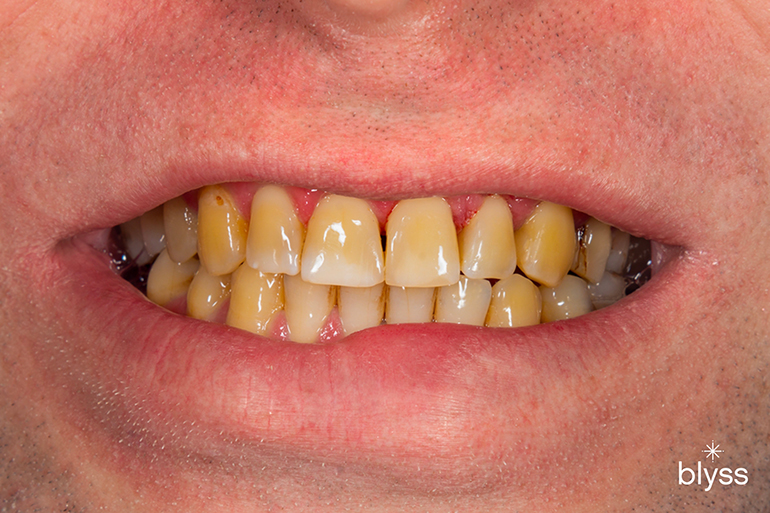Financing dental implants is often the most significant stumbling block for individuals looking to replace their missing teeth.
The cost can be prohibitive for some people, so it’s important to find a payment plan that will work for you.
The good news is that there are plenty of financing options available to help you get the care you need. At Blyss, we don’t just work with one or two dental implant financing companies. We work with almost all the major ones to give you the best terms based on your dental needs and financial profile.
Whether you’re looking for a way to spread out the cost of your treatment or you need financing options that offer longer terms, you can find a solution that works for your budget.
Here are three of the best dental implant financing options to consider.
Types of Dental Financing Options
Dental implant financing is an excellent way to pay for your dental implants. It makes the procedure more affordable. Plus, all these payment plans require zero down payments. You can start your dental implant treatment right away once you are approved for the payment plan.
Option 1: Standard Dental Loans
Standard loans are a form of financing that can be used to cover the cost of dental implant treatment. They are similar to car loan financing offered by your bank or credit union
Most people like this type of loan. Standard loans allow you to break up the cost of a dental implant procedure into a fixed monthly payment that fits your budget and timeline.
You can make a car loan manageable. Wouldn’t you want to invest in a similar loan that improves your health, appearance, and confidence?
Yes, rates are higher for all medical loans because the loan companies don’t have collateral like a car. But I think it’s worth every penny.

You can break up the cost of dental implants with a standard loan, similar to a car payment. The cost is broken up into smaller, more manageable, and fixed monthly payments that fit your budget and timeline.
Components of a Standard Loan
- Principal Amount: The amount of money that you are borrowing to pay for your dental implants.
- Fixed Interest Rate: The fee, typically between 3.99% and 27.99%, charged by the lender to cover their operating expenses and profit.
- Term Loan: The length of time you have to pay back the loan, usually 12-60 months. Here at Blyss, we have loans that can go up to 84 months.
Pros:
- Fixed monthly payment – easier to include the cost in your budget
- Lower interest rates – starting interest rates are lower than credit card financing
- Easier to understand – everyone is familiar with how a car loan works
- No prepayment penalty – most dental financing companies provide no prepayment penalties
- Soft credit check – applying for pre-qualification doesn’t affect your credit report
- Widely available
Cons:
- One-time upfront payment of the entire procedure – your dentist will process and collect the entire amount of the procedure (from start to finish). This makes it harder to get refunds when things are not going well.
- It can only be used with one implant provider – you have to commit to one implant provider that will process your financing. They have the funds. It makes it harder to switch dentists when things are not going well.
Here are the dental financing companies that we recommend for standard loans:
Looking for dental implant payment plans in the Del Mar and San Diego, California areas? We provided the links above to pre-qualify for financing here at Blyss Dental.
Dental Implant Financing Tip: Ask your dentist for the cost of the entire dental implant procedure from start to finish. Some dentists only advertise or quote you on the first half of the dental implant treatment (implant post-installation). This is common among oral surgeons. You want to make sure you finance the entire amount to avoid having to get another loan for the rest of the procedure.
Option 2: Medical Credit Cards
Medical credit cards are like traditional credit cards, but they are specifically designed for medical and dental care expenses. It can only be used by participating dental offices.
You get pre-qualified for a certain amount when you apply for financing. You can use that amount to finance the entire dental implant procedure or just a portion of it.

Whether you need to pay for a full dental implant procedure or just a portion of it, medical credit cards make paying for those costly treatments easy and convenient.
Components of a Medical Credit Card Financing
- Credit Limit: This is the pre-approved amount that you can spend for your treatment.
- Interest Rate: The fee, typically between 6.99% and 27.99%, charged by the lender to your loan
- Balance: The outstanding balance that you owe on your medical credit card.
- Minimum Monthly Payment: The minimum monthly payment that you have to pay monthly based on your balance.
Pros:
- Pay as you go – you won’t have to pay for the procedure upfront. You use your credit card to pay for the procedures performed only.
- Easier to switch providers – Not liking your implant dentist? It’s easier to switch dentists during your All on 4 procedure since you didn’t pay for the entire procedure upfront.
- Wider selection of providers – you can get dental work from any participating dental provider at any time. You can even use a medical credit card for participating in vision, cosmetic surgery, or other medical providers.
Cons:
- Higher Interest rates – medical credit cards have higher interest rates than traditional credit cards. Many start at 15% and go up to 29.99%.
- Harder to budget – it’s not as easy to budget the amount you have to pay overtime since you are paying the procedure in installments. You don’t get a fixed payment amount during a specific set of months
- Lower Approved Amounts – in general, we see that patients get smaller approved amounts compared to standard loans. Many have a $30,000 limit. This can be a challenge with big procedures such as full mouth implants that can cost up to $55,000. At Blyss, we have standard loans that go up to $75,000.
- It can be a money trap if you don’t understand the terms – the payment plans are not as straightforward as standard loans. Make sure you understand the terms before signing the loan.
Here are the dental financing companies that we recommend for medical credit cards:
Dental Implant Financing Tip: I know emotions sometimes drive your decision to get dental implants. Do not sign payment plans from your dentist’s office unless you understand the payment terms and interest rates. This is especially true with medical credit cards because the terms are not as straightforward as standard loans. At Blyss, we make sure you understand all the terms before we proceed with the financing.
Option 3: No-interest Implant Financing
No-interest payment plans are the best plans if you know that you can pay the entire amount in full during a period of 6, 12, or 24 months. You won’t incur any finance charges as long as you pay the entire balance during that particular period. That’s zero.
But there’s a big but. Your interest may jump to a high-interest rate, such as 26.99% if you fail to pay the entire loan during that grace period.
Some dental financing plans, such as Care Credit, are even harsher. That 26.99% can be applied to the entire loan amount from the beginning, not just the remaining balance. So yes, you make sure you have enough money in your budget to pay for the entire implant procedure during that grace period.
This type of financing is only available to a few dentists. Why? Because it’s the dentist who pays for the finance charge, not you. The cost can be very expensive for the dentist.
Components of a No-Interest Dental Payment Plan
- Principal Amount: The amount of money that you are borrowing to pay for your dental implants.
- No-Interest Introductory Period: 6,12, or 24-month period where you don’t get charged any interest
- Interest Rate After Period: You typically default to a high fee of more than 25% if you don’t pay the balance after the introductory period.
Dental Implant Financing Tip: What’s the best loan? Blyss Dental has some of the best no-interest loans that don’t carry heavy penalties if you miss paying the entire amount in full. We have loans that default to standard loans of 48 to 72 months after the grace period. What’s the best part? You know in advance what all the rates are, including the standard loan rate after the grace period. This gives you the best of all three types of payment plans.

With zero percent intro loans, you’ll only begin to pay interest on the loan balance at any rate you agreed upon when applying after the introductory period ends.
Pros:
- Avoid paying interest if you pay the balance in full during the introductory period.
- Avoid paying for a procedure in cash upfront – have cash but don’t want to pay the entire $20,000? Maybe you want to keep funds for emergencies. Get no-interest financing to hedge the risk.
- Builds Credit – Making timely payments on your no-interest dental implant financing helps build up good credit over time, making it easier for you to apply for other types of financial products in the future, such as loans or mortgages.
Cons:
- Potential high-interest rates after the promotional period ends
- Risk of late payments
- Requires a high credit rating for approval – will require a good credit score for approval
- Tend to come with hidden fees and additional costs.
Here are the dental financing companies we recommend for standard loans:
- Lending Point
- PatientFi
- United Credit
Dental Implant Financing Tip: Compare different offers to find one with no annual fee or other hidden costs. Look out for introductory periods, interest rates, fees, repayment plans, and other features that come with each offer.
Here’s a table to give you a visual comparison of the different types of dental implant financing options.
| Financing Company | Min Credit Score | Loan Amounts (Min-Max) | Annual Percentage Rates (APRs) | Available Terms |
|---|---|---|---|---|
| CareCredit | 620 | $0 - No Max | 8.99% to 26.99% | 6-24 months |
| LendingClub | 580 | $1,000 - No Max | 8.30%-36.00% | 24-60 months |
| Proceed | 660 | Up to $75,000 | 6.99% - 29.90% | 6-72 months |
| Lending Point | 500 | Up to $36,500 | 7.99%-35.99% | 3-60 months |
| Alphaeon | 640 | $250 - $25,000 | 7.99%-28.99% | 6-60 months |
| United Credit | 580 | $500 - $25,000 | 9.95%-34.90% | 12-48 months |
Application Requirements for Dental Implant Financing
In order to qualify for a medical credit card, certain eligibility requirements must be met. Generally, these include
- At least 18 years old
- Good credit history (usually 600+) or a cosigner with good credit
- A regular source of income.
- A valid government-issued ID, such as a driver’s license or passport
Dental financing will allow you to get the cost of a monthly payment similar to a car payment ($250 to $650) for periods between 6 and 84 months with interest between 3.99% and 27.99%.
Dental Implant Financing Tip: Use your household income when applying for dental financing. That means you can include all the income in your household, such as that of your wife, partner, parents, etc.
Other Ways to Pay for Dental Implants
In addition to the financing options above, there are other ways that you can pay for your dental implants. These include:
- Personal Loans: You can approach your credit union or online lenders directly to apply for a personal loan to cover the cost of your dental implants. This is usually only recommended if you have good credit and a steady source of income, as these are generally more difficult to obtain.
- Medical Insurance: Many medical insurance plans will cover at least some of the costs associated with dental implant procedures
- Home Equity Loans: You may also be able to use the equity in your home as collateral for a home equity loan or line of credit. This is generally recommended only if you own your home outright and have a good credit history.
- Using Savings/Investments: If you have money saved up or you have investments such as stocks or bonds, these can be used to cover the cost of your dental implants.
Tips to Get the Best Deal on Dental Financing
It’s important to understand how different types of dental financing work in order to find the best deal for you. Read on for some tips on how to make sure you get the best deal on dental financing.
1. Pre-qualify With Multiple Companies
Research all the available options and apply to as many financing companies as possible. Most financiers provide pre-approvals with “soft” credit inquiries, which means they won’t affect your credit score if you have a good one. That means many financiers will be competing for your business.
2. Request Options
Many dental offices only work with one or two financing companies, so by asking for more than one option from your dentist, you can ensure you’re getting the best deal possible.
3. Include Your Household Income
When applying for financing, ensure that you include all income from your household (including spouses) in the income section of the application. This will ensure you get an accurate assessment of how much money lenders are willing to loan and at what interest rate.
4. Research Fees and Interest Rates
Different providers will offer different fees and rates, so make sure to check several sources before making a decision. You should also pay attention to any early payment or late payment fees associated with your loan or credit card agreement; these can add up quickly if you’re not careful!
5. Understand Refund Policies
Many companies offer a refund option if things don’t work out between you and your dentist. For example, if you financed $10,000 but only used $5,000 of it after changing dentists or canceling treatment midway through, then you can ask them to return any unused amounts back into your account.
Can I Still Be Eligible for Dental Financing with Bad Credit?
Having bad credit can be a real impediment to getting access to the dental care you need. Fortunately, financing options are available for those who don’t have perfect credit or enough cash to pay upfront.
Dental offices offer different plans that make it possible for people with bad credit to still take advantage of the dental services they require.
Most dental offices offer an in-house payment plan that allows you to spread out your payments over a period of time.
The terms of these plans vary from office to office, but they typically require an upfront down payment followed by monthly payments that fit within your budget.
Dental Implant Financing Tip: At Blyss, we can offer dental implant financing with as low as a 580 FICO score if you have an established payment history.
In some cases, these plans may not require a credit check or even proof of income—just the assurance that you are able to make regular payments on time each month.
Again, depending on the dental office, this type of plan might be available even if you have bad credit or no credit at all.
Dental Implant Financing Tip: It doesn’t hurt to apply. Remember, pre-qualification is typically a soft credit inquiry that doesn’t affect your credit score. Keep in mind that approval is not just based on your credit score. This accounts for many more variables in your financial history.
Conclusion
There are many different financing options available for people with bad credit who need access to dental care.
While having bad credit can make it more difficult to get approved for a loan or line of credit, there are several financing companies that offer flexible terms and low rates to help you cover the cost of dental procedures.
With some planning and research, you can get the dental care you need, even if you have bad credit.
Regardless of which option you decide on, Blyss Dental strives to provide quality care at an affordable price.
Contact us today to learn more about financing options or to book a free consultation.
Sources Cited From
- What is CareCredit? | CareCredit. (n.d.). https://www.carecredit.com/
howcarecreditworks/ prospective/ - Patient Solutions. (n.d.). LendingClub | Patient Solutions. Retrieved December 24, 2022, from https://www.lendingclub.com/
patientsolutions/ - Loans from LendingPoint | Apply Now. (2022, October 12). LendingPoint. https://www.lendingpoint.com/
- Loan Programs |. (n.d.). https://www.unitedcreditunion.com/
loan-programs/



